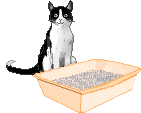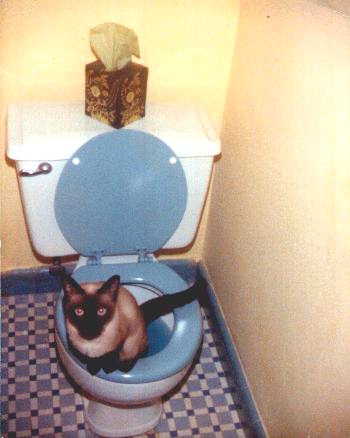Please Help Pets by Donating One Dollar
How to Litter Box Train your Cat or Kitten
Get your kitten off to a good start with an appropriate litter box. Often a
plastic box is the most practical and easy to clean.
The sides should be low enough that your kitten can easily climb in and
out.
Place the box in a relatively quiet area of the home with minimal traffic,
where the kitten can have some privacy. Be certain the box is easily
accessible, perhaps near to the kitten's sleeping area.
Some kittens dislike scented litter; it is usually best to start with an
unscented clay or clumping litter. If you already have cats at home, provide
an additional box for each new cat.
Most kittens will automatically use kitty litter in preference to other
surfaces, except perhaps for the soil of a potted plant.
To prevent mishaps, keep plants out of the kitten's reach or cover the soil
with pine cones or decorative rock.
To ensure that your kitten uses its litter box every time, always keep it
within eyesight. If it stops playing and begins sniffing around, gently carry
it to the litter box.
Praise any sniffing or scratching, and give it loads of praise or a small
food treat for eliminating.
Whenever you are unable to watch the kitten, restrict it to a cat-proofed
room with its litter box. Do this for at least the first two weeks, until your
kitten is using the box regularly.
Keep the box clean so that your cat will return to use it. Once you have found
a brand of litter, type of box, and location that your kitten likes, avoid
making sudden changes. If you want to change the litter, place the new box
with the new litter in the new location, but do not take away the old box
until the kitten is using the new litter. Or try mixing the new and old for a
few weeks.
Since it is important that the kitten feel comfortable around its litter box,
try to prevent anything unpleasant from happening when it is near its box.
Don't give your cat medicine or scold it when it's near the box. Locate the
box in an area free of startling noise, such as a washing machine, radiator,
or furnace. If you need to keep your kitten away from children or dogs, use a
baby gate with a kitty door.
When Mistakes Occur
It doesn't take long for a kitten to develop bad habits, so it is essential
that you identify and correct mistakes right away.

Causes of House Soiling
- Change in the brand of litter
- Scented litter additives or the odor of cleansers/deodorants
- The litter box is not cleaned frequently enough
- The litter box was moved to a noisy area
- The kitten was frightened in or near the box
Medical problems
Most cats will not soil an area where their food or water bowl is placed.
To decrease the appeal of the soiled area, place a sheet of plastic carpet
runner, two-sided sticky tape, an aversive odor (perfume, deodorized soap), or
a motion detector alarm in the area.
Never punish a kitten for making a mess outside of its litter box.
Punishment usually makes things worse or creates other problems such as fear
of the owner, especially if you swat your kitten or rub its nose in the mess.
Using a covered litter box can control the odor in the home and be helpful
for kittens with poor aim. If your cat refuses to use a covered box, condition
it to this setup by placing a large cardboard box over the litter box.
Gradually decrease the size of the cardboard box until it approximates the
commercial box. Then make the switch.
If your kitten continues to eliminate out of the litter box, take it to
your veterinarian for a physical exam, and possibly lab tests to make sure
there are no existing medical problems. For example, bladder diseases,
diarrhea, and constipation can be irritating for the pet and cause it to avoid
the box.
Spraying
As kittens mature, they may begin to spray. Spraying is a form of
territorial marking-cats typically will urinate on vertical surfaces such as
walls and furniture. Although neutering eliminates most spraying, some
neutered cats do spray. If the problem persists after neutering, seek advice
from your veterinarian.
Kittens are creatures of habit. Once you find a litter and box location
that your cat likes, stick with it.
Wayne L. Hunthausen, DVM,
and Gary M. Landsberg, DVM
Fleabags

Litter Box Odors
We have the solution to Effectively Remove cat odor, pet dander,
smoke odor and allergens from your home.
Wouldn't you like to have a home full of pure and clean air and no
embarrassing pet odor when company comes? And breathing pure air
also will help you and your pets live longer and healthier lives
Go
Here to find out how you can Remove Pet Odor